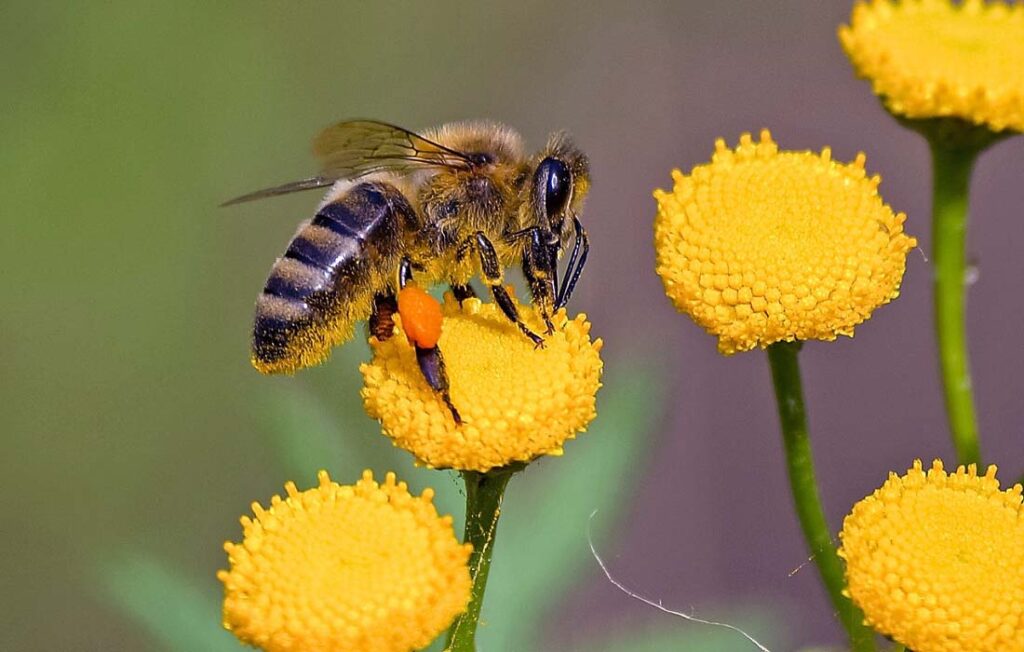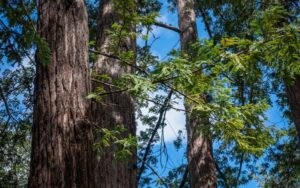Did you know that bees are responsible for one of every three bites of food you eat? That’s right. Bees and other pollinators are essential parts of the food system and are necessary for the growth of about 75% of global food crops, including fruits, vegetables, seeds, and oils—let’s not forget to mention honey and beeswax. Honeybees’ pollination services have such a massive impact that they contribute more than $15 billion annually to the US economy.
So, it’s really no surprise that the recent trend of declining bee populations is a huge concern. According to the USDA, bee colonies have decreased from 6 million in 1947 to 2.5 million today—that’s a 60% reduction. There are a variety of reasons for this decline, from habitat destruction to global warming and pesticides.
The good news is that there’s a lot you can do to help save bees and other pollinators. Here’s the buzz on 13 ways you can be a pollinator champion.
(Politely) Demand Change
Call Congress
The EPA is tasked with ensuring all Americans have access to clean air and water. What you may not know is they also regulate the pesticides that are killing bees. Unfortunately, they are operating with limited funds. The Saving America’s Pollinators Act of 2021, currently in legislation in the House of Representatives, would help save bees and other pollinators by banning the use of harmful pesticides until they are deemed safe. Call your representatives and encourage them to pass this bill.
It’s also important to note that the EPA actively considers incident report data to help inform pesticide regulatory decisions. You can report bee kill incidents here or send a message directly to the EPA and encourage them to ban the harmful pesticides that are killing bees.
Advocate for Green Rooftops in Your City
Green rooftops are a great way to bring more nature into urban areas and create a tranquil space for relaxing and increase pollinator habitats. These small patches of green in ever-growing concrete cities allow pollinators the opportunity to build homes and collect pollen. Ask your city council to provide incentives for residents to make their rooftops diverse and pollinator friendly.
Ask Your City and State to Pass Pollinator Protection Policies
Friends of the Earth and the Responsible Purchasing Network released a guide called Buyers Bee-Ware to help you make a difference for pollinators in your community. Encourage your city to follow the example of places like Eugene, OR that have banned neonicotinoids, the most commonly used class of insecticides and a key factor in bee declines. You can also tell President Biden and your governor to get serious about protecting pollinators with a comprehensive strategy.
Put Your Money Where Your Mouth Is
Adopt a Honeybee
Team up with World Wildlife Fund (WWF) to Adopt a Honeybee. These virtual adoptions will support WWF’s global conservation work. Their adoption kits, which can include a stuffed honeybee, make great gifts that can inspire others in your life to support the bees as well.
Donate to Organizations Working to Support Pollinators
There are many organizations out there with a focus on protecting pollinators. You can help the bees now by donating your time and/or money to one of EarthShare’s partner organizations: American Farmland Trust, Friends of the Earth, Beyond Pesticides, and Xerces. If you want to do more than donate money, check out what fun volunteer opportunities exist in your area. Become a citizen scientist and help track bees, enjoy a hive-to-table cocktail for your next Happ-bee Hour, sign a pollinator protection pledge, and more.
Buy Organic
If you don’t have your own garden, commit to buying organic products whenever possible. Not only does this ensure you’re not consuming chemicals like insecticides or promoting their use, but you’ll also be backing organic farms, which provide 50% more support to pollinators than conventional farms.
Develop Your Green Thumb
Plant Native Vegetation to Attract Pollinators
With native plant species, increase the biodiversity of your yard or garden while providing forage for bees, butterflies, and birds. The Xerces Society’s Pollinator Friendly Plant Lists can help you choose which plants are best for your area.
Mow the Lawn Less Frequently
What homeowner doesn’t want to hear this? Letting clover and other flowering weeds grow provides a nutritious habitat for bees and other pollinators. These beneficial plants are often seen as blights to a golf-course-like lawn typically managed with detrimental weed killers. Be sure to avoid products that are meant to kill these hidden helpers. Just tell your neighbors you’re supporting the bees the next time your grass gets knee-high and full of weeds.
Grow Organic
If you have your own garden, going organic will make your yard a friendlier place for pollinators to live and work. Avoiding fungicides, insecticides, and other toxic pesticides to control weeds creates safer habitats. Instead of chemicals, use mechanical methods to remove weeds—consider barriers or removing weeds by hand—and biological methods, such as adding microorganisms to your garden.
Provide Nesting Sites for Bees
Bees like to build their nests in dead trees, brush piles, and old rodent holes. In addition to less mowing, try to decrease the amount you rake leaves in the fall (as much as you can tolerate anyway.) Leaves provide living space in cooler climates for bees as well as butterflies and moths. Ask your local beekeepers association for advice and instructions on what else you can do to attract pollinators safely to your yard, or build a pollinator habitat with tips from the Nature Conservancy, the National Wildlife Federation, and the Pollinator Partnership.
Teach Others About the Crucial Benefits of Pollinators
Educate Your Neighbors
When you get really excited about something, it’s fun to share your ideas with those close to you. Circulate educational materials to teach your peers about why pollinators are so important and encourage others to adopt bee-friendly behaviors. Not one for paperwork? Consider throwing a pro-pollinator garden party to demonstrate pollinator-friendly practices in person. You too can have a pollinator-supportive community with a little work and communication.
Relocate (Rather Than Destroy) Hives
If you have a hive in your yard that is becoming a safety hazard, don’t try to spray it or move it yourself— ouch! —because that will kill many of the bees inside. Instead, contact a removal service or a local beekeeping organization to help with changing the hive’s location and keeping the bees inside safe.
Celebrate Pollinator Week
Pollinator Week is an annual celebration hosted by the Pollinator Partnership that happens every June on an international scale. You can participate by hosting or attending pollinator activities like garden tours, farm walks, plant sales, flower giveaways, and other fun opportunities. All these events help support the environmental services of bees, butterflies, bats, moths, birds, and beetles.
From small changes in your own backyard to societal changes in the larger community to lending your voice to legislative efforts, there’s a lot you can do to help protect pollinators. Choose one or more of the 13 options listed above and check out our Giving and Engagement platform to discover even more great nonprofits supporting pollinators in your area. The bees, the future of our food, and your belly will thank you.




